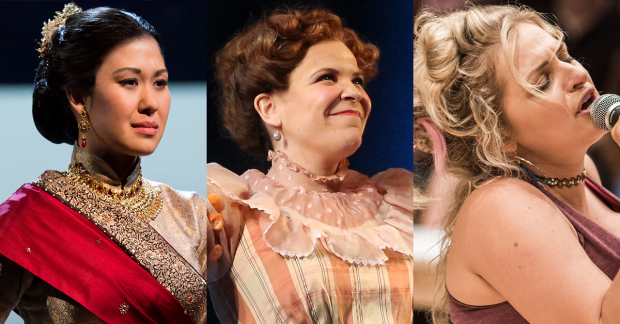How Rodgers and Hammerstein Led Ruthie Ann Miles, Lindsay Mendez, and Ali Stroker to the Tonys

(© Paul Kolnik/David Gordon/Teddy Wolff)
Within the last five years, three of Rodgers and Hammerstein's secondary heroines have earned Tony Awards for their portrayers. Ruthie Ann Miles, Lindsay Mendez, and Ali Stroker took home statues for their turns as Lady Thiang in The King and I (2015), Carrie Pipperidge in Carousel (2018), and Ado Annie in Oklahoma! (2019), respectively, earning critical and audience acclaim along the way. In their own important ways, they've also made both cultural and theatrical history, opening the industry's eyes as to what's possible in terms of artistic representation.
When it comes to the Tonys, the Featured Actress characters in Rodgers and Hammerstein musicals have a fascinating history. Leading roles Anna in The King and I have frequently won the prize; in fact, with wins for three separate productions (most recently for Kelli O'Hara), Anna is tied with Rose in Gypsy as the most Tony-ed female role in Broadway history.
With the exception of Carousel's BFF character Carrie (which led a young Audra Ann McDonald to her first of six Tonys in 1994), Lady Thiang and Ado Annie were new to the Tonys stage. Joohee Choi earned the nomination for playing Tuptim in 1996, while Mary Beth Peil somehow received a Featured nod for playing Anna in 1985. With Oklahoma!, the only supporting female role to be nominated with frequency is Aunt Eller (Andrea Martin in 2002, Mary Testa in 2019).
If the recent revivals of The King and I, Carousel, and Oklahoma! prove anything, it's that the Rodgers and Hammerstein canon of musicals is as open to contemporary interpretation as the works of Shakespeare. With the right actors and the right amount of directorial investigation, you can stage a traditional King and I, like Bartlett Sher did in 2015, or a reimagined Oklahoma! in a makeshift community hall, like Daniel Fish is currently doing, and the shows can speak just as profoundly to our current world as they did to the one the writers were living in. Miles, Mendez, and Stroker were the right actors for their productions, and they were rewarded — but as they all note, it wasn't just about them.

(© David Gordon)
Miles is the second Asian woman in history to win a Tony (24 years after Lea Salonga in 1991) and attributes her victory, and the strength of her performance, to the work of King and I director Bartlett Sher. "Bart saw that Lady Thiang has a voice, even though she doesn't have the power to say the things she wanted to say." She also notes that Sher, like Oklahoma! director Fish and Carousel helmer Jack O'Brien, came to these decades-old shows with specific visions in mind. After all, "What's the point of reviving something if there isn't a specific point of view to share this time around?" Miles says.
The message of Sher's King and I was partially responding to the political world of 2015. When different world crises emerged over the course of the run, Miles says her director was known to come back to Lincoln Center Theater to work with the actors, even though the show had been open for months. "Bart had a very specific message for 2015, and when there were different [world] troubles that we needed to address as a company, we re-rehearsed the show so it could relate to 2016. It was always changing."
"I really feel like you saw that character like none of us had ever seen before," says Mendez, one of only a small handful of Latina performers to win in the Featured Actress category, remembering Miles's performance. "No one's investigated that role the way Ruthie and Bart had, and it's really important to not look at these characters in the lens that they were written in. It's our responsibility to bring our current feeling to it and say, 'How do I get into the mind of this woman in the late 1800s, early 1900s, and give her strength and power, not play her stupid or like a victim?'"
Mendez says that was one of the biggest challenges about playing Carrie Pipperidge. "When you look at it on paper, you could easily see someone play her stupid," she says. But Mendez wasn't familiar with Carousel when she signed on. She didn't know that Carrie was a comedic role. It wasn't until she got into the rehearsal room that she started peeling away the layers and discovering "this woman who has so much life happening to her so quickly, rushing to nail down a husband and follow life the way she should, the time period being what it was."
Jack O'Brien was key in helping Mendez unlock a role that was unlike anything she, a veteran of "brooding roles" in Wicked and Dogfight, had ever played. "Jack let me experiment and play and pushed me to do so," she says. "I felt really free to try things, and he gave me a lot of rope and a lot of ideas." As a result, "People kept saying, 'I didn't know it was that funny,' which was interesting. They didn't feel like it was supposed to be. I'd never seen it, so I had no idea what it was 'supposed to be.' I never felt like I had to land a moment. I just had to tell the tale. A lot of times, I didn't really get why people found it funny. But I guess that's what comedy's about, the mystery of the truth being something that resonates with people in a way that makes them laugh."
Stroker, the most recent Best Featured Actress in a Musical, notes that these roles "provide an opportunity for actresses to honor the text, but also bring their own self to it." Stroker is the first actor in a wheelchair to win a Tony, and her uproarious performance uses her abilities as a jumping-off point. Stroker, director Fish, and choreographer John Heginbotham have developed a remarkable physical language that allows Stroker to glide along the performance space and become intimate with her onstage lovers, played by Will Brill and James Davis.
Stroker says her win "feels like an honor and responsibility at a really exciting time in history," but what's just as important are the multifaceted ways that it's "opening people's eyes to what is possible. The disabled community is the largest in the country. One in five Americans are disabled. So it's really exciting to be like, 'We're here and we are not going anywhere.'"
It's not solely about representation, though. "What we've done with Oklahoma! proves that classic musical-theater material can live now and make history now, as it did 75 years ago. It's so important for people to be seeing different kinds of, in this case, women playing these roles. But first and foremost, the writing is really strong, and in this case, me included, these actresses have done something really cool with their story line."
The results are "something wonderful," indeed.










